|
|
|
Sort Order |
|
|
|
Items / Page
|
|
|
|
|
|
|
| Srl | Item |
| 1 |
ID:
158062
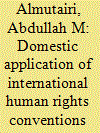

|
|
|
|
|
| Summary/Abstract |
This article examines the application of international human rights conventions in Saudi legislation where Sharia is the main source of law. Saudi laws often adopt the dualistic approach and its international human rights obligations must be in agreement with the Sharia. This paper further intends to explore the Kingdom of Saudi Arabia's (KSA) position on reservations and ratifications of international human rights conventions generally and in the context of migrant workers’ rights particularly. Since the KSA has not ratified any convention related to migrant worker protection, it is essential to examine the role of national human rights organisations in implementing and promoting human rights in the KSA and the article explores the significant efforts made by these organisations to implement and protect the rights of migrant workers in the country. It argues that the KSA has ratified a number of human rights conventions such as the International Convention on the Elimination of All Forms of Racial Discrimination; however, it has failed to comply with its provisions. It is suggested that non-discrimination provisions of some of these conventions may be used to advance migrants’ rights in the country.
|
|
|
|
|
|
|
|
|
|
|
|
|
|
|
|
| 2 |
ID:
158065
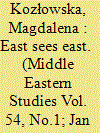

|
|
|
|
|
| Summary/Abstract |
This article explores travel pieces on Jews in Islamic countries published in the Jewish press (in Yiddish and Polish) in interwar Poland. It argues that many of the strategies of representation that Polish–Jewish journalists employed to describe the Jews of Islamic countries during this time borrow from the way the Jews of Eastern Europe were perceived. Turning the Western gaze on the Orient served Eastern European Jewish intellectuals as an act of multiple redemption. Finding themselves in between modern and traditional identification, Polish–Jewish journalists decided to ensure their belonging to the world which they saw as civilised by transposing concepts they knew from home.
|
|
|
|
|
|
|
|
|
|
|
|
|
|
|
|
| 3 |
ID:
158060


|
|
|
|
|
| Summary/Abstract |
While considerable existing scholarship examines the degree to which Muslim Brotherhood affiliates have toned down their religious rhetoric to compete in electoral politics, very little of that discussion centres on how Brotherhood movements react when political space narrows. Even fewer studies have examined the recent behaviour of the Brotherhood affiliate in Kuwait. In this article, we demonstrate how the Kuwaiti Muslim Brotherhood has, in the face of increased government surveillance and restriction of political space, moderated its Islamist agenda to become part of the broader opposition agitating for structural political reforms, often at the expense of the traditional agenda of Islamizing society.
|
|
|
|
|
|
|
|
|
|
|
|
|
|
|
|
| 4 |
ID:
158067
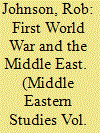

|
|
|
|
|
| Summary/Abstract |
The historiography of the First World War in the Middle East has changed over the last two decades, and while some established works stand the test of time, there are new works to consider. This article is designed to assist scholars seeking to trace the contours of recent publications, illustrating the variety of themes and subjects that surround that conflict. Military history is by no means the sole issue of interest, and readers will be struck by the range of works on culture, ethnic and sectarian groups, propaganda, diplomatic history, and medicine, among others. The centenary of the First World War has produced its own crop of studies, but the Middle East continues to attract significant interest and tragically recent conflicts inevitably raise questions about the origins and impact of that war in 1914–1918.
|
|
|
|
|
|
|
|
|
|
|
|
|
|
|
|
| 5 |
ID:
158066
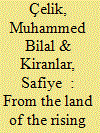

|
|
|
|
|
| Summary/Abstract |
In this study, we analyse a visit by two Japanese cruisers (the Izumo and Yakumo), commanded by Admiral Yamamoto, to Turkey in 1926. Although the visit's aim was overstated at the time, its contribution to Turkish–Japanese relations cannot be disregarded. Ambassador Obata and Admiral Yamamoto's emphasis on and discourse in relation to Turkish–Japanese friendship demonstrate that the Japanese imposed different meanings on the trip, the most important part of which was to Istanbul, where visits to official departments, programmes for naval students and familiarizing Istanbulites with Japan were important activities. The Istanbul press published news about the Japanese guests and their daily activities. After Istanbul, the delegation went to Ankara for official visits. However, these visits were little reported in Turkish news columns or the press of the period. In fact, the visit is reflected in just one or two sentences in the pages of history.
|
|
|
|
|
|
|
|
|
|
|
|
|
|
|
|
| 6 |
ID:
158061


|
|
|
|
|
| Summary/Abstract |
Majority of temporary labour migrants in the Gulf originate in countries that are not involved in devastating armed conflicts. Migrations from conflict-ridden countries to the Gulf are not negligible, however, and they have been growing in the last decades. The overview of migrations from the major refugee-producing countries suggests that we may distinguish between different categories of mixed migrations; inter alia, migrants who migrated to the Gulf prior to, during and after the armed conflicts in their home countries. We argue that these migrations happened in parallel with the tremendous economic growth that the Gulf countries have experienced in the last decades. Of note, however, is that they also coincide with escalations of armed conflicts in several sending countries, which may indicate that some of these migrations are also the result of war- or security-related push forces. We also contend that the dynamics of migrations from countries in conflict may in addition be related to the foreign policies of the Gulf countries, which are often closely related to their treatment of different migrant groups.
|
|
|
|
|
|
|
|
|
|
|
|
|
|
|
|
| 7 |
ID:
158064
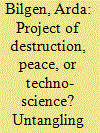

|
|
|
|
|
| Summary/Abstract |
The Southeastern Anatolia Project (Güneydoğu Anadolu Projesi, GAP) was initiated in the 1970s to produce energy and irrigate arid lands through constructing dams and hydroelectric power plants on the Euphrates and Tigris rivers and extensive irrigation networks in southeastern Turkey. Over time, the project was expanded to achieve a wider range of goals in different fields and radically transform Southeastern Anatolia Region. It is also widely claimed that GAP was initiated to address the root causes of the Kurdish question in Turkey and that security considerations and political calculations were actually the raison d’être of GAP. However, this supposed link between GAP and the Kurdish question was often established in a simplistic manner and the question how these two have been related – or not – remained largely untangled. This article aims to fill this research gap and examine the complex and multi-dimensional nature of the interrelationship between GAP and the Kurdish question based on diverse primary and secondary data sources. Accordingly, the article identifies and discusses major narratives in which GAP was conceived as a political and strategic ‘anti-Kurdish’ plot; remedy for the conflict; and totally technical non-political project and presents an alternative and more accurate perspective on how to interpret this relationship.
|
|
|
|
|
|
|
|
|
|
|
|
|
|
|
|
| 8 |
ID:
158063


|
|
|
|
|
| Summary/Abstract |
Civil rights of the minorities, substantially framed in the Lausanne Peace Treaty in 1923, were subjected to secular regulation with the Civil Code issued in 1926 in Turkey. The annulment of the Lausanne provisions was justified with collective petitions penned by representatives of the non-Muslim communities. The collective petitions, called ‘mahzar’, constituted the legal pretext by which the non-Muslim communities were reconciled with the secularizing civil code of government. This article unravels the manuscripts of ‘mahzars’ and sheds light on the political backdrop whereby non-Muslim minorities renounced their rights in Article 42. Drawing on the scripts of mahzars, it tracks the justification and arguments made by the disclaimers of non-Muslim communities. It also delineates the debate on the act of renunciation by examining the transcripts of the negotiations at Lausanne Peace Conference and the internal and international press. Despite standing for the consent of the non-Muslim minorities, the collective petitions, this article argues, embodied hegemonic means of government to subdue minority rights.
|
|
|
|
|
|
|
|
|
|
|
|
|
|
|
|
|
|
|
|
|